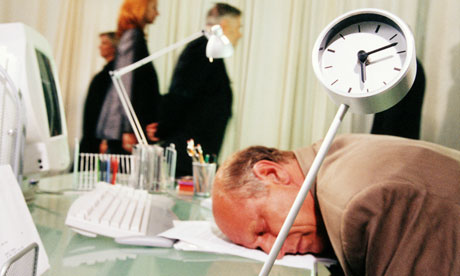
Time to catch up, I fear, with my old friend Dr Joe Vitale, who last appeared in this space promoting an ancient – and, inevitably, "secret" – Hawaiian system for lasting wealth and happiness. Apparently it's not working, though, because Dr Joe toils on, launching several ebooks promising to reveal how to generate a "passive income". He's hardly alone: in recent years, such guides have become a huge online phenomenon. The obvious wisecrack would be that all these ebooks tell you to write an ebook on creating a passive income, promote it via the web, then head to the beach while the cash rolls in. But here's the thing: as far as I can tell, they really do. It's one big self-referential loop, a Mobius strip in a hall of mirrors on an Escher staircase made of 24-carat preposterousness.
You wouldn't fall for such nonsense, obviously – yet the lure of a passive income represents one of two competing notions about work with which most of us do grapple. One, beloved of many business gurus, is that work should be deeply fulfilling and self-actualising. The other is Vitale's (and also, among others, Tim Ferriss's, in his bestseller The 4-Hour Workweek): to demand fulfilment from our jobs is asking too much of them. Better to minimise work's burden while maximising what it pays. Yet both approaches – living to work, working to live – are fraught. "Do what you love and the money will follow" seems unreachable and smug to those trapped in jobs they hate; but deliberately deciding to consign so many hours to something unfulfilling seems insane. Or you cobble together a compromise, which never quite feels right either.
The freshest perspective I've found on this comes not from Hawaii but from Your Money Or Your Life, a 1992 book by Joe Dominguez and Vicki Robin (not to be confused with Alvin Hall's book of the same name) which is overdue for rediscovery. Dominguez and Robin did much to introduce "voluntary simplicity" to the yuppie era, and are especially insightful on the hidden costs of jobs (if you're spending lots on holidays and entertainment to de-stress, and restaurant food because you've no time to cook, it may be more profitable to go part-time). Their main point, though, is that we've confused "work" with "paid employment". Paid employment per se can't ever be fulfilling, they argue. But work – defined broadly as productive effort, thus including childcare and much else – may be the only source of real fulfilment. In reality, your work and employment may overlap partly or wholly. The benefit lies in making the mental separation.
This may seem obvious. Yet once you've internalised the point, it makes little sense to hold, as a moral position, that a job ought to be fulfilling, or to insist it can't be. Dominguez and Robin advocate a switch in perspective: ask what work you find fulfilling – it needn't be some grand calling – then figure out paid employment's role in facilitating it. Maybe your goal will be a job that fulfils you – or a less mentally taxing one to finance non-job work. Maybe doing your favourite work for money would turn a passion into a chore. Even if you're in no position to change your job, knowing why you're really doing it – and what not to demand from it – can instil a sense of clarity and autonomy.
Alternatively, feel free to try Vitale's advice on building a "perpetual-motion money machine". Hey, it might work. As the proverb almost goes, you'll never know until you've paid him.
oliver.burkeman@theguardian.com
twitter.com/oliverburkeman

